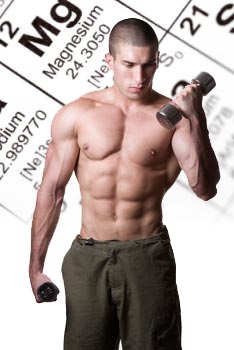Magnesium for building muscle
 Magnesium is very important for many enzyme reactions, well-functioning muscles and muscle building.
Magnesium is very important for many enzyme reactions, well-functioning muscles and muscle building.
Magnesium, like calcium, is one of the essential substances and must therefore be made available to the body in sufficient quantities every day. Magnesium occurs in drinking water as well as in all foodstuffs; it is used in the body through absorption in the small intestine. The total body of an adult human contains approximately 20 g of magnesium, but 1000 g of calcium. The substance is required not only to be involved in over 300 enzyme reactions, but also to influence the potential of cell membranes and muscle development.
A magnesium deficiency can trigger different symptoms in people, cardiac arrhythmias and muscle cramps being the most important. Since it stabilizes the muscle and nerve cells and is also extremely important for organ work, a daily dose of around 300 mg should be ensured through a balanced diet with certain foods. If there is an increased need, such as in competitive sports or during pregnancy, as well as in various deficiencies, the daily need can exceed Food supplements or in an emergency with medication.
What is the importance of magnesium for weight training?
As a strength athlete, you know the foods that are important for you and muscle building in the context of glucose and carbohydrate supply. Magnesium is particularly found in whole-grain products such as whole-grain bread, rice and whole-grain pasta. Certain mineral waters contain a higher concentration of magnesium than others and are therefore labeled as medicinal water. Magnesium is also found in liver, poultry, fish, chocolate, nuts, vegetables, fruit and dairy products. You can use these sources to maintain the magnesium level in your blood in a natural way or to ensure that it is in sufficient quantity and thus optimally support muscle building.
![]()
Athletes usually have an increased need for magnesium and other minerals. Intensive training can also lead to a magnesium deficiency, as can special demands on the muscles, stress, etc. Magnesium is also known as a high-performance mineral, which shows that it is particularly important when the muscles are used. Here it helps against muscle cramps and sore muscles and is so important for building muscle because it optimizes the metabolism in the muscles.
How can magnesium be supplied to the body?
As an athlete, you will of course primarily pay attention to a healthy diet. The aforementioned foods usually contain enough magnesium to ensure the recommended daily dose of around 300-350 mg. This could be ensured, for example, by a serving of sunflower seeds or other nuts, oatmeal and vegetables together with a decent piece of meat. You can cover the additional needs with magnesium-fortified supplements like we do here in the shop to offer. Since magnesium is also responsible for the release of adrenaline and this is required so that the body can quickly access its energy reserves, it plays an even more important role in strength training and muscle building.
Suitable magnesium supplements from our shop:











